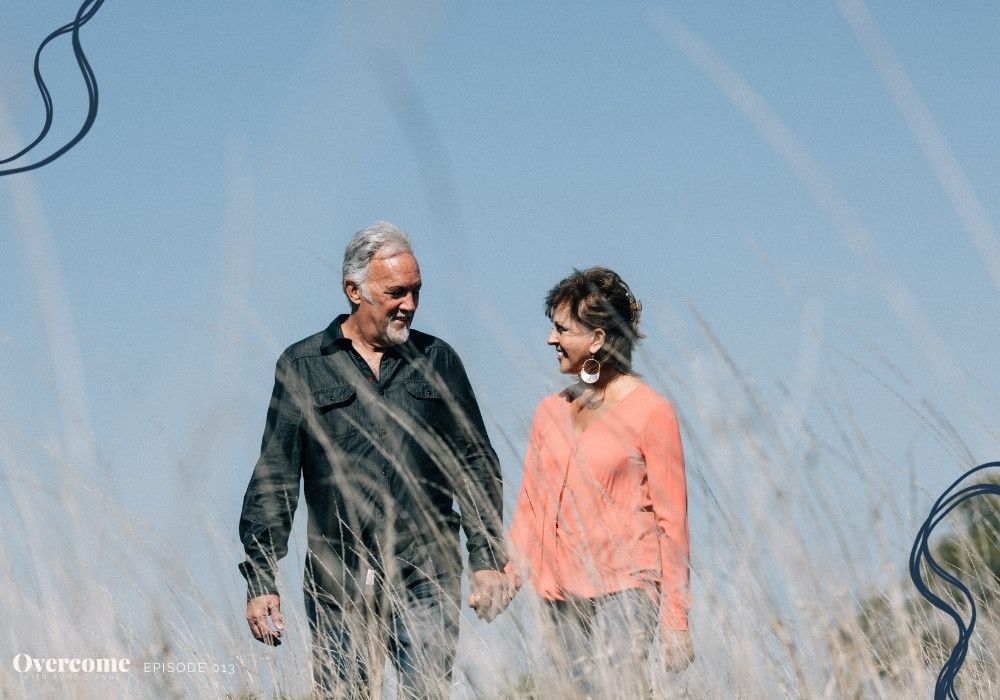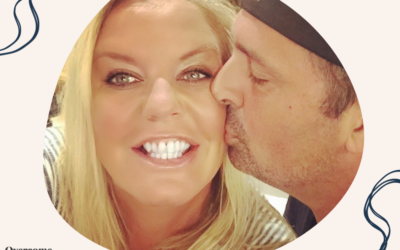When my husband, Jonas Beiler, and I recited our vows 53 years ago, his only real goal in life was to get married and have a family. But the death of our 19-month-old daughter and the subsequent sexual abuse I experienced at the hands of our pastor put his dream in jeopardy.
However, as we’ve both learned together over the years, we may not be able to change our past, but love and forgiveness will, in fact, truly change our future.
In this episode, I’ve asked Jonas to share what he experienced and went through in those moments. And as you’ll see, his willingness to embrace love and forgiveness is why we’re still together today.
To hear our entire conversation, listen to the podcast. Or keep reading below to catch the highlights.
The man, the myth, the love of my life
I’m not shy about sharing my story. And if you haven’t heard it, please go back and listen to episode 2 and episode 3 of the podcast because they’ll give the background for what we’re talking about today.
In those episodes, I tell the story of how Jonas and I lost our 19-month-old daughter, Angela, and about how our pastor and spiritual leader took advantage of that death to abuse me sexually.
But this story isn’t just mine to tell. It’s Jonas’s as well because he has his account of overcoming these tragic events. So I want you, friend, to hear his story and how the things we went through took us into many years of darkness. But as you’ll see, the darkness couldn’t swallow the light.
So who is Jonas? Jonas is my husband of 53 years, and I can honestly say that he is my very best friend in the entire world. I often tell him I’d rather be with him than with anyone else. Most couples don’t survive the things we’ve been through, and I’m eternally grateful for his unconditional love, support, and unending grace in the darkest times of my life.
And while I love to dote on my husband, he’ll be the first to tell you that the truth of it is, “God has done a work of grace in both of us. That’s why we’re still one.” I’ve heard him say that many times, but the truth of that statement still impacts me. There truly has been a work of grace in both of our lives.
The death of Angie
When our daughter, Angie, was 19 months old, Jonas and I were youth pastors at our church. So every Monday morning, he would go to the church to work in the office. And on this particular Monday, someone came in and told him there had been an accident with Angie.
She had been run over with a tractor, dying instantly, and I was at the clinic with her. Jonas doesn’t remember how he got there, but when he did, I took him from the waiting room to the back hallway where Angie was lying.
He admits that when things like this happen, we go into such shock that it’s “hard to articulate what you were thinking or how it all went down.” He does remember, though, me asking him to pray and ask God to heal Angie.
Here’s the thing about Jonas. For as long as I’ve known him, he’s been my fix-it man, fixing everything for me. It’s one of the things I love about him. And I think I believed that his prayers could heal Angie.
But instead of praying, he said the first thing that came to his mind: “If she is where we want to be [heaven], why should we do that?” It was one of those moments I knew he was right.
We spent time with Angie at the clinic before getting into the backseat of my dad’s car as he chauffeured us back to the house. When we arrived, my mom came and met us in the walkway and told us that they had found Fi, my sister, and had brought her into the house. Fi is the one who accidentally ran over Angie with the tractor. (I encourage you to listen to Fi’s entire story about all of this in episode 7).
Jonas recalls my mom saying that Fi thinks we’ll never forgive her. And what immediately came to his mind was, “What Fi doesn’t know is that I will never hold this against her. It was an accident.” He wanted to reassure Fi that we weren’t angry with her.
You see, Jonas had a brother that was killed in a motorcycle accident and a cousin who died when he fell through the ice in a frozen pond. So he was familiar with accidents that change people’s lives, and this is why he was able to say to Fi, and mean it, that it was an accident.
As he puts it, “I came to understand that accidents are something that have a hundred reasons why they should not happen. So you can discuss it all you want—why it should not have happened—but it did. And you deal with the aftermath of that because it changes you forever.”
Not knowing how to grieve
Part of having someone close to you die is learning to grieve. But as Jonas remembers, we just didn’t understand what it meant to grieve the way we do now, and he wishes we had had more information about grief and what the grieving process looks like.
As he tells it, our church at the time had a “very strong evangelistic thrust,” and most of what we heard relating to God involved evangelism. “So we never heard messages about grief, anger, and pain in that way. It was all about evangelism. And it did not prepare me for my journey.”
Jonas says he had no idea of how hard it would be. For him, the most challenging part of the entire grieving process was watching me muddle my way through it. And because we didn’t understand how to grieve, he admits he didn’t understand what my sister, Fi, was going through either.
As he puts it, “Even years later, you gain some additional understanding or definition of what actually happened. When you say [that] tragedy changes you, it’s definitely true.”
Unfortunately, we didn’t have an understanding at the time. Jonas believes that if we had, and if we would have known to go for counseling, we would have understood how to grieve, and we would have done better and maybe even recovered quicker.
Instead, I grieved alone, not wanting Jonas to see me cry. And over time, we began to exist together in a silent marriage. Of course, we were still husband and wife and still did all the normal things. But there was a growing distance between us.
Jonas admits that “experience doesn’t mean you have all the answers like people think you might.” But he has learned some things over the years. For example, he says that some people think the grief process is about turning it all off, so they don’t feel anything anymore. But he says that’s just not true.
Jonas will still recall memories of Angie, and sometimes those memories bring him to tears even all these years later. But as he says, “That’s grief.” Reliving those memories and allowing those memories to be felt and experienced emotionally is part of the grieving process.
“Allow the emotions that come and go. Your emotions are to be experienced, not judged. Let it happen.”
But because we didn’t know how to grieve, the death of Angie took me into a situation where I was sexually abused by my pastor, muddying the waters even more. And it brought a whole other level of sadness, grief, darkness, confusion, and pain into our marriage.
Dying inside
The sexual abuse I experienced went on for years. Our pastor took advantage of me, but Jonas had no idea of what was going on. And he had no reason to. Jonas looked up to our pastor. He was our spiritual leader, and Jonas took a lot of direction from him.
We were youth pastors in his church, and he allowed us the freedom to lead and care for the young people in our way. And there was revival happening in our county with our pastor at the helm. So Jonas just thought he was “anointed of God.” He now understands that he was a con man but at the time didn’t see it that way at all.
Eventually, we moved to Texas with three other families to start a church with this pastor. But the hope for a new beginning never happened. Jonas’s main concern was me. I was down to 95 pounds at the time, and he says that I was continuing to deteriorate. He knew things weren’t right between us, but he had no idea what to do.
So he did his best to continue and fought hard to have some normal traditions in the home like eating dinner together and putting the kids to bed. But “at the same time,” he says, “I was dying inside because I didn’t understand.” And some days, he felt desperate. However, he was determined to fight for our marriage and our family despite how he felt.
Eventually, I got out from under the abuse I was experiencing and knew I needed to tell Jonas about what happened. He says that when I told him, it was the worst day of his life. He felt stripped of his spirituality, masculinity, and self-esteem all at the same time.
A few other men in the church went through the same thing as he was, and they got together to share their stories. Of course, they were all hurt and disappointed, but it gave them a chance to air things out.
Signs of hope
Because he was desperate, Jonas made a phone call to a man who had come to the church a couple of weeks before leading a marriage enrichment seminar. Jonas asked him, “What do I do now because I’m at the bottom?” He wasn’t even sure he wanted to stay and thought about getting in his car and driving off.
The man challenged Jonas that if there’s any chance for him to make the marriage work, he would need to love me the way that Christ loves him. Those words challenged him because Jonas knew that no matter what he did in life, Christ’s response to him was always grace and love.
And so he chose to try and love our kids and me the same way. He admits that he “fumbled and stumbled around in [his] effort to do that.” But he tried. And one day, he overheard me say that I was beginning to be attracted to his spirit. For him, that was a sign of hope.
Learning to forgive
Through a counselor friend of ours, Jonas began learning about forgiveness in a way he had never known before. One of the things this friend shared with him was that Jonas needed to take the time to work through the “emotional aftermath” of all he had experienced. He never pushed Jonas to forgive quickly but instead encouraged him just to be willing to forgive.
Not being forced into it allowed Jonas the time he needed to work through all the turmoil he had been through. And eventually, he was able to forgive … not only me but our pastor as well.
It might sound crazy that he would forgive the pastor too. Why forgive the person that caused us so much pain? Jonas says, “You forgive because you can’t forget, and you forgive to rid your soul of the poison that could rob you of every spiritual thing you’ve ever accomplished.”
He says forgiveness is for yourself—it’s a selfish thing. You do it to “release those that hurt you so that you can be free from them.”
But he also acknowledges that forgiveness is a process. It doesn’t mean you’ll never get angry again about what happened or what was done to you. But it’s a journey, and “when life hurts you, then healing becomes your journey, and it does not happen all at once.”
I can honestly say that without Jonas’s forgiveness, without his acceptance, I would not be where I am today or be who I am today. Jonas and I have experienced the truth that our past won’t change, but our future did through love and forgiveness. And as he said at the beginning, God did a work of grace in both of us, and that’s why we’re still one.
Jonas, you are, and will always be, my best friend. I’m grateful for you and for who you have helped me become. And I’m so thankful we get to share our story with others so they can see the power of love and forgiveness. Thank you for sharing.
Jonas has a book called Think No Evil that dives deeper into the power of forgiveness and shares more about his journey of forgiveness. I highly encourage you to check it out. You can get it on my website, or Amazon.






